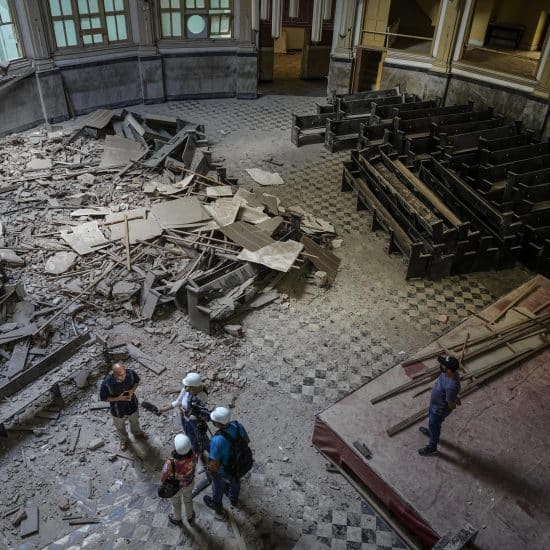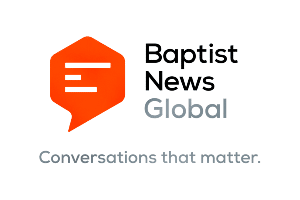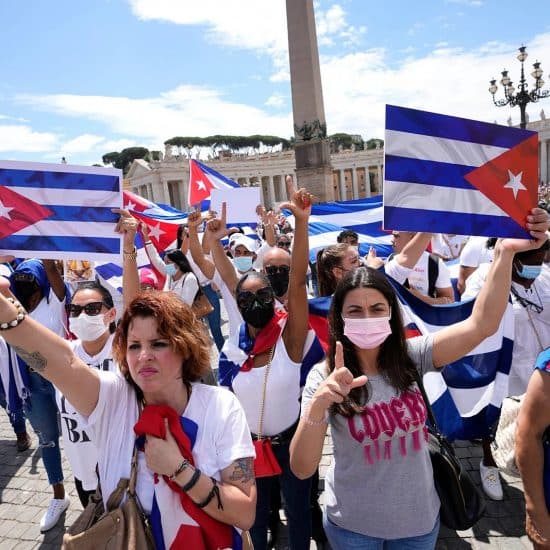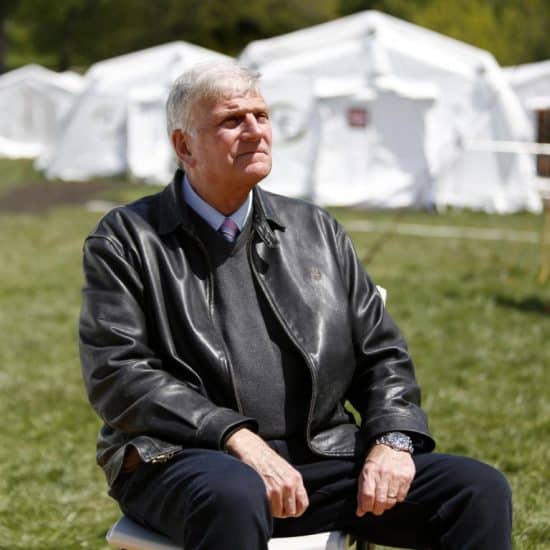In June, two Cuban Baptist pastors traveled to the U.S. to meet with Midwest Baptists. Josué Rodríguez Legrá (below left), is president of Convención Bautista de Cuba Oriental (Eastern Baptist Convention of Cuba) and pastor of 1ra Iglesia Bautista de Palma Soriano (1st Baptist Church of Palma Soriano). Diorlis (Joey) Hernández (below right), is pastor of Sexta Iglesia Bautista de Santiago de Cuba (Sixth Baptist Church in Santiago de Cuba). They met with leaders of Central Baptist Theological Seminary in Shawnee, Kan., Churchnet in Jefferson City, Mo., Southwest Baptist University in Bolivar, Mo., and The Baptist Home in Ironton, Mo. They spoke at First Baptist Church in Lee’s Summit, Mo., and Josué preached at Familia Cristiana Internacional in Jefferson City. The two pastors also visited the Word&Way offices for an interview with Editor Brian Kaylor. Gary Snowden, missional collaboration team leader for Churchnet and associate pastor at First Baptist Church in Lee’s Summit, assisted with the translations.
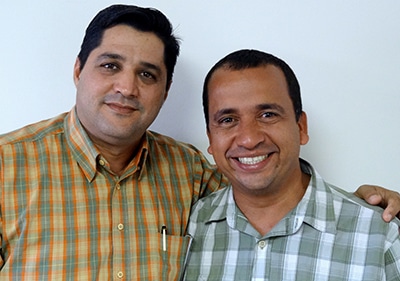 Josué, you are president of the Eastern Baptist Convention of Cuba. Could you tell us about the Convention?
Josué, you are president of the Eastern Baptist Convention of Cuba. Could you tell us about the Convention?
Josué: The convention is about 111 years old. We have about 622 churches. We are an institution that grew as a result of the work of North American missionaries. That’s why we have a missionary DNA. We are now working in all the island — from the east to the west. Our mission is to reach all the regions of our country. We have at least one church in every province [state]. And our next goal is to plant a church in every leading city so that we will eventually be present everywhere in our country. We have more than 1,000 missions that are really churches in formation. We have more than 800 missionaries that work in these missions. We have more than 4,000 small groups. Our greatest growth has been concentrated in the past 25 years.
You are both pastors of local Baptist congregations. Can you each tell us a little bit about your call and how you came to be a pastor?
Joey: I was participating in a congress for young people of the convention, and there I received a call to serve. So, I went to my church in the mountains, a very interesting place because it’s called “the house of the devil.” But the church is called “the house of God.” So, in the “house of God” I was formed as a missionary, and from there I went out and started a new church. My wife and I left the secular work that we were involved in and we began to live by faith. We were receiving a salary of $5 a month with two small kids. There were only seven members of the church. God used us there and in six years we planted a church with everything. We had a church building built, a pastoral home and we left two functioning mission places and we left equipped leaders. One of those is now studying in the seminary and two of them are leading churches today. It’s a blessing for us. … Our Sunday School attendance [at Sixth Baptist] has doubled. Our church was praying for 60 students in Sunday School. Now we have between 120 and 140. God has blessed us. We’re also using sports ministry as well: fútbol [soccer], baseball, kickball. Those have been very effective tools. In one week, we were able to work with more than 100 children and young people.
Josué: I was born in a Christian home and I came to Christ when I was 10 years old. But I had a health problem that was due to a blood type. I almost died. My mother shared with me some of the things that happened to me as a child. And I understood that God had saved and preserved my life for a purpose. So, I grew with this understanding and I thought that God was calling me to be a pastor. When I was in primary school, behind the house was the farm and my first sermons were preached out there in the field. So, I grew up knowing God had a purpose for my life in pastoral ministry. It was very clear to me that was what God wanted me to do, even ahead of anything else like being president of the convention. My principal calling is to pastor a local church.
In Cuba right now, it seems there is both great revival as well as unique challenges. Could you share about the two sides of this coin?
Joey: It’s true we do have great revival. Our churches are growing, planting new churches. But we have the challenge that we cannot build church buildings. Given that we can’t build church buildings, we have worship and meet wherever we can. It’s a problem for the missionary and for the person who attends as well — one of the greatest challenges that we have. Another great challenge we have is how to sustain, how to support these missionaries because the churches don’t have sufficient offerings. For example, I have a small church, but I am helping to support five missionaries and there are other churches that have even more missionaries than that. We don’t know how to support them sometimes because many of them have families as well. I was a missionary and I know what it means to try to live on $5 a month. I know also how to live without $5. It’s a great challenge.
Josué: We’re talking about some of the things that we have achieved as a convention in evangelist work and outreach. Cuba’s not like many other countries in the world where the churches can meet wherever they desire to. For a church to really develop its life, it needs to have a place to gather. The growth of the church in situations like this brings with it great challenges for us because they’re small congregations that barely have resources. They need both places for the churches to worship as well as homes for the missionaries. So, we recognize that this is a situation that we have to confront. At the same time, we realize we cannot stop planting new churches and seeking to reach new people. We understand that this is God’s work and he will send his help from someplace.
What would you like Baptists in the United States to know about life in Cuba?
Joey: I hope that my Baptist brethren in the U.S. will know that the scarcity that we confront in Cuba has made us very strong. What appears to be a weak point is something that God has used to expand the church. The less we have, the more we look and seek after God. And if someday something happens there that simulates what is happening in the U.S., God is going to be strong. God’s working powerfully in our community. Our church is outwardly focused. We’re offering courses of English free to the community. We’re working with addicts in the community to help them recover. We’re working with children — both Christian and non-Christian — of our community to help. We’re helping to transform the community. And we’re trying to live the gospel that we preach. It’s difficult, but we are doing it. And people are looking at church as if it were an oasis. We have a freezer now and we’re able to offer ice to the community for cold water; this is something that the community appreciates. God is doing great things in our community. God’s grace is powerful upon us.
Josué: The Cuban church is growing in spite of all that we’ve mentioned. And even though we have found ourselves in situations of scarcity and confrontation, the church continues to grow. We have a gospel worthy of being exported to all the world. There is leadership within our churches to help reach the unreached. Do we need resources? Yes. Do we need friends to work alongside us? Yes. But we believe that we can also cooperate with others in the development of the gospel and in the evangelistic work of the church today towards the world.
To follow-up on that, Josué, you all have a vision not just for Cuba but for missions around the world.
Josué: That’s why I was saying we have something to offer as well. We don’t put ourselves in the place of saying we just need someone to come and cooperate and work with us. Something that’s happening in our convention is that we have recently established our own foreign mission board. I think that in the history of the Church in one future day, we believe that Cuba’s going to take its place in the part of world missions. We understand that we have missionaries who are capable and trained, with a clear and good call from God. And they are ready to go anywhere in the world. I think the way in which we have lived and experienced the gospel in Cuba has prepared us to be able to live in other places in the world.
Joey, since this is your first trip to the United States, would you share observations — good or bad?
Joey: I had no idea what the U.S. was like. I had seen it in television, in pictures. I’d seen Americans visiting Cuba. But when I came to this country, I rapidly discovered I didn’t know anything about it. It’s a very organized country. People are really good. It’s very clean country. I’ve enjoyed very much being here. Anything that you want to find is here, and that’s been very surprising for me. I’d never been in a Walmart before. When I went to Walmart, I almost died! And we can eat beef here freely, something that we can’t do in our country. People have received us warmly wherever we’ve gone. Everything has been wonderful. I want it to happen 11 times a year!

